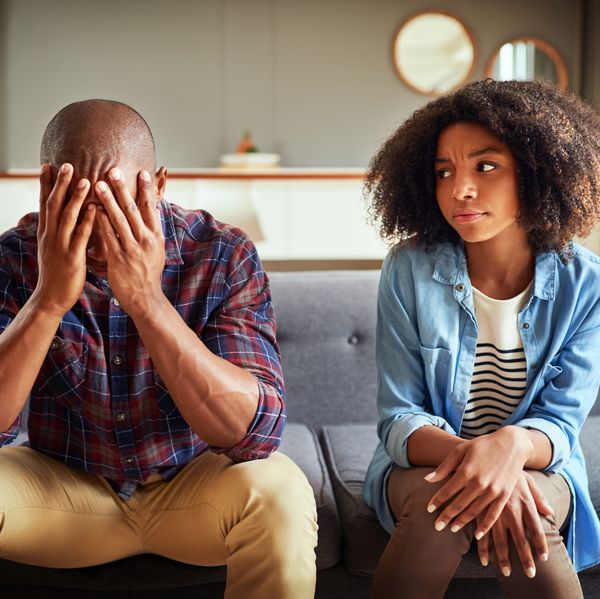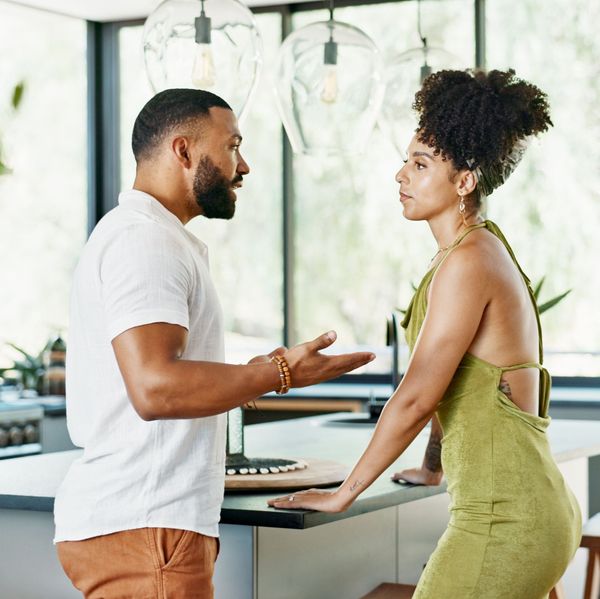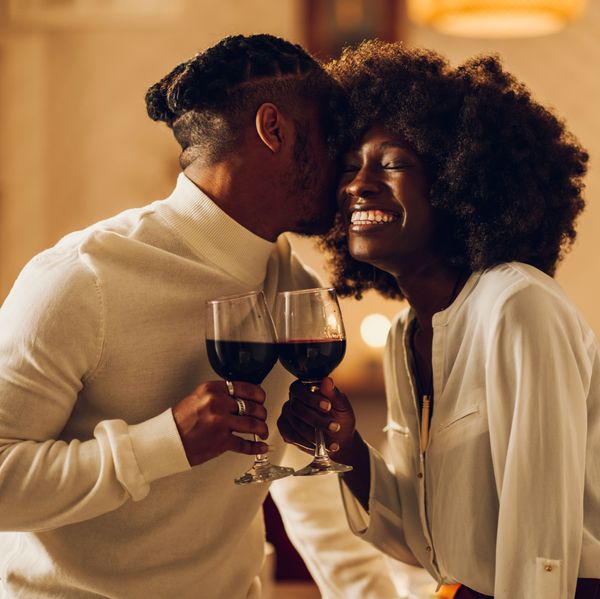Girls' Trips & Group Pics: Are We Losing The Essence Of Friendship In The Age Of Social Media?
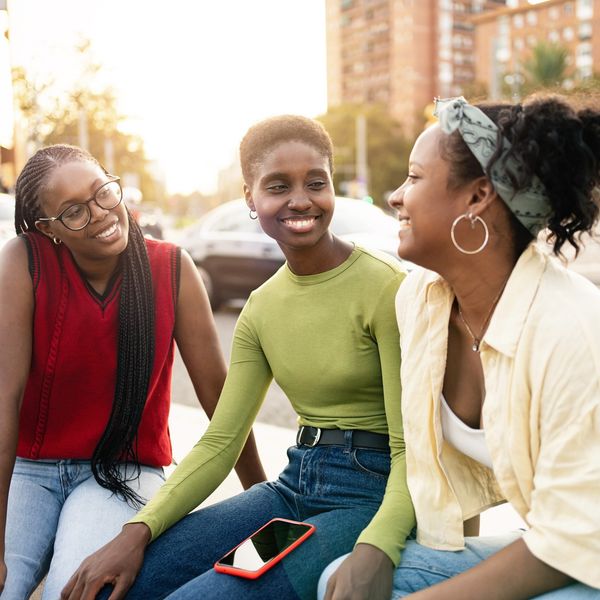
A few months ago, I found myself on social media, scrolling, and came across a video of a bunch of friend groups taking girls' trips and felt an uncomfortable amount of jealousy and, if I'm honest, also sadness.
My friends and I are all in different places in our lives and haven’t traveled together in almost a decade. In undergrad, I went on spring break with friends, and in my very early twenties, I experienced a few trips with individual friends, but these friend groups that travel together can’t relate lol, and I’m not going to lie, it bothers me because I’ve always wanted that.
At first, that reality made me a little emotional, and I was brought to tears until I saw the comment section with responses like “Step one, find friends first” or “Does anyone else not have friends who like to travel?” While I found solace in that and have since understood the importance of travel groups, making friends with women who love to travel and have the schedule for it, and appreciating my friendship groups for what they are, I now wonder, overall, if social media making us compare our friendships in the same ways that we compare our romantic relationships?
Somewhere along the way, have we lost the plot? Is there friendship and connection outside of meeting up at the hottest new restaurant, girls' trip where we all wear the same outfits, or dinner parties with color schemes (not judging any of these choices, because I love them all), what about the friends that come over to give you a hug when you’ve had a bad day? Where are the friends who will run errands with you? Where are the friends who will give you their Finsta password to find out if your man has a side chick? Where are the friends who show up to your kids' sporting events?
Growing up with shows like Living Single and Girlfriends, we had the blueprint and somehow have missed the mark. We love to discuss the impact of these shows and how they made us feel seen - but do we hang out at each other's houses? Do we embrace friends who don't dress like us? Or are we only interested in friends who fit a certain aesthetic or are exactly like us?
In search of the truth and various perspectives, we’ve talked with 16 Black women for their points of view on whether they believe social media impacts friendships and if it’s made some friendships superficial.
Lisa, NJ:
Many of my closest friends are not on social media, however, the friends that are don’t respond to things unless (to me) they are concerned about something when they read into a post. Then I get a call like, “Hey girl, are you okay, I saw your post." Or they will be ringing my doorbell…even if they are still living in the Bronx. There are a core group of friends that we check in on a few times per month and meet up but for the ones that are on social media, it seems like I’m the only one that sends cards and reaches out more.
To me, they let social media be their only form of contact unless something serious is going on, sadly. They send greetings on social media, yet I still do both if you are a friend, that’s just me, and they know it… Sometimes, social media can be an easy way to avoid that old-school outreach. But let them need prayer even if I haven’t spoken to them in months. I'll just pray and love every moment.
Courtney, RI:
I do believe socials have an impact on friendships that make them “appear” superficial— however, I don’t want to believe that beautifully documented moments equal superficial friendships. I think some of the best moments with girlfriends aren’t always pretty and well-documented. BUT. There are times when I do capture things with my friends for social media specifically, and those are some rock-solid relationships - we are just cute. And outside. And y’all need to see us, lol.
JT, NC:
Social media has helped me connect with friends since relocating, however, while battling a chronic condition and sharing the deeply personal things I share about panic attacks and my pain, it triggers a lot of people, usually those closest to me. Meanwhile, I have strangers in my DMs daily praising the work I do and telling me I need a bigger platform. It breaks my heart when those I once loved rip me apart solely for being honest. I also think people put way too much thought into what people post instead of just having a real convo about what is really triggering [them] deep down.
Jennifer, NY:
In my opinion, a lot of friendships have become superficial - quite frankly, a lot of women are starting to look alike! There's nothing wrong with sharing posts, keeping your page a certain way, documenting while you are out, etc., but I have noticed many friendships have become "let's go here so we can get good pics" and less about building a bond.
Petulia, NJ:
I feel like social media makes friendships seem like they’re not adequate enough by the display that certain people have. It makes people feel like if they’re not giving out lavish gifts, they’re not good enough friends. If they’re not doing expensive dinners, things like that but friendships are more than that.
Courtney, NJ:
I think, in general, social media has played a role in how friendships are viewed! I think people see the glitz and the glam of friendships that people post however, they don’t see the times when you’re not talking… where there might be friction (women being women)… when you lose touch (life be life-ing), etc. I think that is what people don’t see and don’t really show the honesty in friendships on social media.
Quadira, NJ:
So I’ve always battled with valuing friendships since I was a kid. One, I would blame the fact that I moved a lot, so whenever I actually developed a friendship with someone, and we got close within a year or two, I had to move, and after a while, that just made me no longer wanna get close with people. And I was always satisfied with having a bunch of siblings and cousins as my friends. So I would have maybe one friend each school year, and I was okay with that.
I never really got to experience like a core group of girlfriends until I was in the 11th grade, and even then, I saw them as disposable and replaceable, but not in a mean girl way. I was just detached from the idea of long-lasting friendships. And I think that it took a toll on me throughout my college years because I would watch everyone have a group of friends that they stuck with for all four years and saw how they built their lives together after college, and I just feel like I missed out on that.
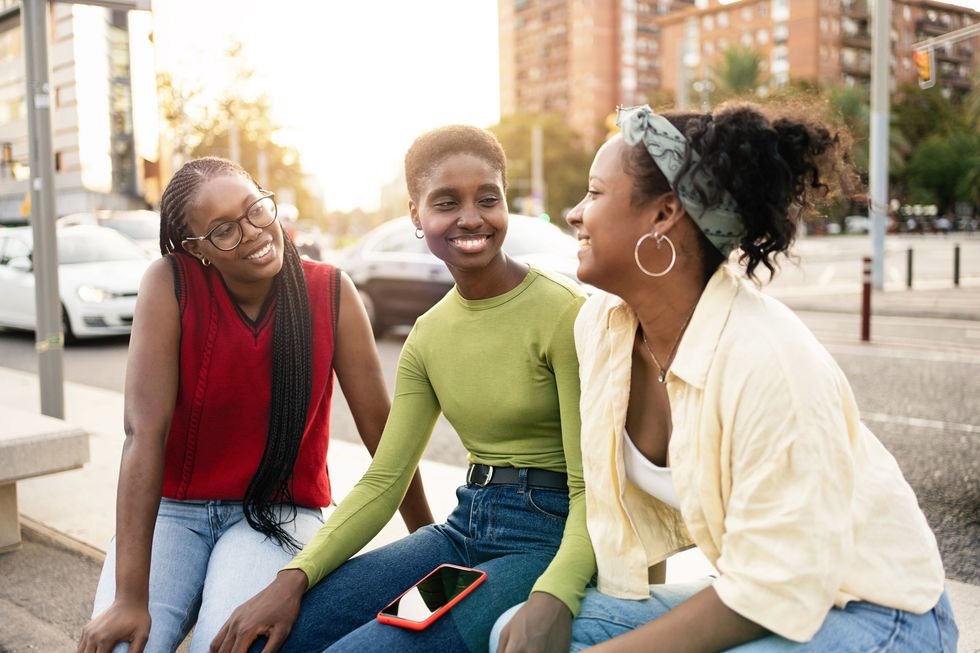
EF Volart/Getty Images
Social media has definitely made me feel a lot of FOMO, like I denied myself something so special by not putting value in building friendships. The cute pictures with friends were something that drove my FOMO, but I feel like it was misguided because I didn’t really understand what it took for people to have these moments with each other for so long OR that some of these photos really didn’t represent a healthy friendship.
But now I have that understanding, and my on-and-off social media moments with my friends don’t always look so aesthetically pleasing because it is authentic to the kind of friendship that we built with each other and does not mirror what other folks got going on.
Like me and my best friend have more crazy-looking FaceTime screenshots of each other than posed pictures. Because that’s just who we are and that’s what puts a smile on our faces looking back at those FaceTime screenshots rather than pictures intended for social media.
Beata, NJ:
I think social media could be a good thing for friendships in that it gives you gathering ideas, recs for places to go, and overall sometimes content that makes you appreciate the tribe you do have when you see it sort of reflected in front of you and can relate. I think some people have even found valued friendships through social media that they may otherwise wouldn’t have found in the “real world.” However, we know that with all things social media - there’s also that downside.
Sometimes, things can feel performative, one could wonder if people are reaching out to hang out because they see you posting a certain lifestyle and want parts or if they’re genuinely looking to connect. There’s also that notion of comparison, which we know can be the thief of joy. Maybe you don’t have that many friends or that core group, and because of what’s being portrayed on social media, you feel bad about what you do have because it doesn’t look the same.
Sade Danielle:
My personal experience is quite the opposite. I think social media has allowed my friendships to strengthen. As we get older, move away, and have limited time because of other responsibilities, social media has kept us together and even motivates us to plan trips, go to events, or just give kind reminders that we can stay connected through content we find and share.
Denise, NY:
I think social media hasn’t made it superficial, but I do think it has made it lack depth and a sense of responsibility.
Daneyah, LA:
I am a huge girls' girl and love all of my friends for who they are as individuals. One thing that has stood out to me is not depending on one friend for everything, as different friendships have different values and bring different things to the table! Yes, I feel like friends engage with each other socially based on time and proximity.
Because I live so far from most of my friend groups, we lean on socials to stay connected, share memes/relatable content, as well as support each other from afar! It’s definitely helped me stay connected. But I can also see the counter of that, where people see friend groups on social media and get attached to the facade but not the work that goes into nourishing those friendships behind the scenes.
Destiny, NJ:
Yes, I believe friendships have become so superficial based on social media and aesthetics. For instance, I’ve observed in my own personal friendships some friends will gravitate to people who have more of a social media following and what is trending on social media. Wanting to go to certain places and do certain things to adhere to a trend rather than just pulling up on your girls to talk. It becomes hurtful, too, when you have your core group of friends, and the group chat goes cold because you can't ever align schedules, but you see them with people who may fit more of an aesthetic.
Nashima, OH:
Social media has significantly shaped my friendships, making it easier to connect with friends no matter the distance. I enjoy sharing updates and experiences through posts and messages, which helps me feel closer to them. However, I've also noticed that it can lead to misunderstandings, as tone can be easily misinterpreted in text. Additionally, seeing friends highlights can sometimes evoke feelings of jealousy or exclusion. Jealousy in the sense I am missing out because I am states away.
While I appreciate the convenience of staying in touch, I often find that online interactions lack the depth of face-to-face conversations. Balancing social media with real-life connections is important for me to truly strengthen those friendships. Overall, social media plays a crucial role in my relationships, but it's essential to prioritize meaningful communication alongside it.
Justine, NJ:
I think social media affects friendships negatively because it offers a false sense of connection. It is nice to see photos or relatable memes that friends post, but it doesn’t give us an inside view of how they are really doing. It can be used as a tool to stay in the loop, but true connection involves vulnerability and impersonal encounters; both are missing from social media.
Jaylon, PA:
Social media has certainly impacted friendships in a number of ways. On one hand, I believe it’s made it harder to have true, deep, and long-standing connections as we compare ourselves and lives to the lifestyle content we see online. But it also has allowed us to connect with people who have similar interests all around the world.
Ebony, NJ:
I don't feel like social media plays a part in my friendship but I can see the benefits and negative impacts. Social media has been a way to celebrate with friends that I haven’t seen and see if they're going on an amazing vacation, getting married, or if they're opening up their own business, so I do find that it gives me opportunities to still be present even if I can't physically show up.
Sometimes, there are negative impacts of social media, especially as Black women. When we’re looking at content comparing our lives, there's so many curated situations on social media, so it may feel like, "Oh my friendship doesn't look like this," so then comparison sets in.
No matter where you fall whether you’ve found yourself comparing your friendships, felt alone, have a strong group of friends, or none at all, remember this - you are worthy of friendship.
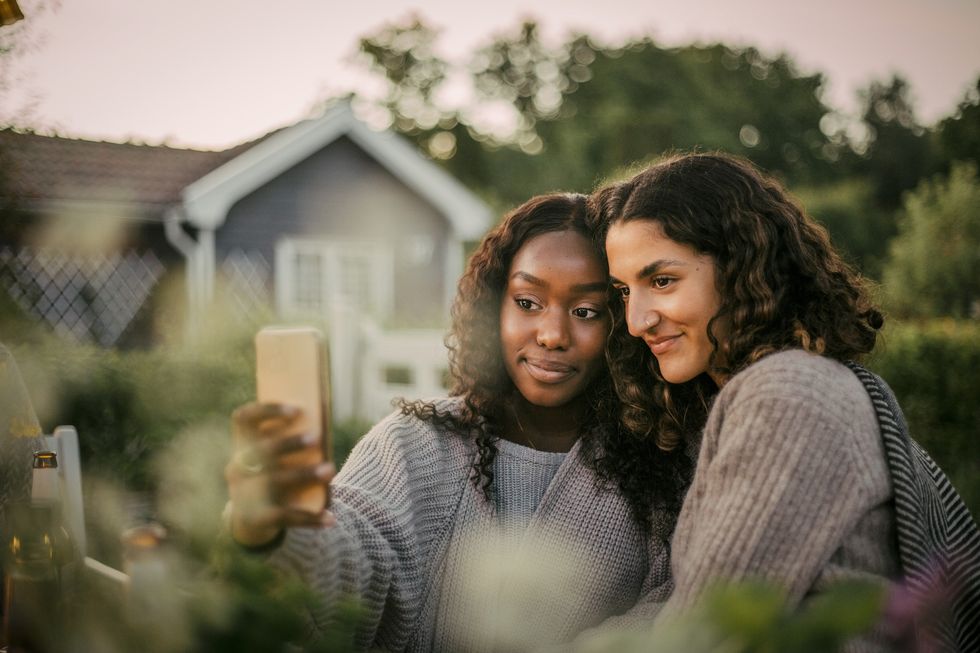
Maskot/Getty Images
Every connection and friendship I have, from my best friends from high school and college to my friends I’ve met as a creator and entrepreneur, brings something unique to my life, and I truly believe that we can celebrate our old friends while embracing the opportunity to make new ones.
It’s important to realize that growth doesn’t mean leaving people behind; instead, it can enrich our lives in ways we never imagined. It’s absolutely possible to cultivate new friendships while holding onto the ones that have been with you through thick and thin. Each relationship adds a different flavor to our lives, and there’s power in allowing ourselves the space to expand our circles without losing the love for those who have always been there.
So, let’s embrace change, appreciate the different paths we take, and honor the friendships that shape our journeys, old and new.
Let’s make things inbox official! Sign up for the xoNecole newsletter for love, wellness, career, and exclusive content delivered straight to your inbox.
Featured image by EF Volart/Getty Images
This Is How To Keep 'Holiday Season Stress' From Infecting Your Relationship
Hmph. Maybe it’s just me, but it seems like there is something really weird happening in the fall season air (because winter doesn’t officially begin until December 21) that cuddle season is in full swing while break-up season is as well. In fact, did you know that break-ups are so popular during the holiday season that December 11 is deemed Break-Up Day?
The reasons why relationships shift around this time vary; however, I did both roll my eyes and chuckle when I read that a very popular one is because it’s an easy way to get out of getting one’s significant other a Christmas present. SMDH.
Anyway, I personally think that the less shallow folks out here may contemplate calling things “quits” or they at least distance themselves a bit from their partner (and what I’m referring to is serious relationships) due to all of the stress and strain that oftentimes comes with the holidays whether it be financial, familial, due to their tight schedules or something else.
Listen, I would hate for you and your man to miss the fun and happiness of experiencing this time of year, all because you are so overwhelmed or irritated that you can’t really enjoy it. That’s why I have a few practical tips for how to avoid allowing the typical holiday season stress from INFECTING your relationship.
Manage Your Expectations
 Giphy
GiphyUnmanaged expectations. If there is a main reason why the holiday season tends to be so stress-filled for so many people, I’d bet good money that this is the cause. And when you’re in a long-term relationship, expectations can manifest themselves in all sorts of cryptic and/or unexpected ways. You might have relatives who assume that you are going to be with them for Thanksgiving or Christmas when you have other plans in mind. You might be thinking that you are going to spend one amount for presents while your man is thinking something totally different. When it comes to scheduling, your signals may be crossed.
And you know what? To all of these scenarios, this is where clear and consistent communication come in. Don’t assume anything. Don’t dictate anything either. From now until New Year’s, mutually decide to check in once a week, just to make sure that you are both on the same page as it relates to the holidays and what you both are thinking will come along with it. The less blindsided you both feel, the less stressed out you will be. Trust me on this.
Set (and Keep) a Budget
 Giphy
GiphyOkay, so I read that last year, 36 percent of Americans incurred some type of holiday-related debt. Hmph. Last year, there was still some sense of normalcy in this country, chile, so I can only imagine what finances are gonna look like over the next several weeks. That said, since I don’t know a lot of people who don’t find being broke stressful, make sure that you and your bae set a budget and then stick to it this year — no ifs, ands or buts.
Because really, y’all — it doesn’t make sense to deplete savings and/or max out credit cards for a few days of giggles only to be damn near losing your mind because you don’t know how to make ends meet come Dr. Martin Luther King, Jr. Day.
And by the way, this tip doesn’t just speak to things like food and gifts; I also mean travel. If it doesn’t make a ton of sense (or cents) to be all over the place this year — DON’T BE.
Keep Matthew 5:37 at the Forefront
 Giphy
GiphyIf off the top of your head, you don’t know what Matthew 5:37 says, no worries, here ya go: “But let your ‘Yes’ be ‘Yes,’ and your ‘No,’ ‘No.’ For whatever is more than these is from the evil one.” That verse right there? Oh, it’s a boundaries lifesaver! I say that because do you see “maybe” or “I’ll think about it” in there? Nope. LOL. It says that you should tell people “yes” or “no” and leave it at that — and that complements Anne Lamott’s quote, “’No’ is a complete sentence” impeccably well. Yeah, you’ve got to remember that anything beyond a yes or no to a request is privileged information; you don’t owe anyone details or an explanation.
Besides, if you are really honest with yourself, when someone asks you something and you give a “Umm, let me think about it” kind of reply, more times than not, you already know what your answer is going to be — so why not let you both off of the hook? Give your response. Commit to that. And let everyone (including yourself) get on with their lives and schedules.
I promise you that when it comes to those holiday parties, you are pissing more folks off by not RSVP’ing or doing so and not showing up than just saying, “Thank you but not this year” off the rip.
Remember That Your Personal Space Is Privilege Not a Right
 Giphy
GiphyA friend of mine recently bought a new house and invited me over to come see it. He’s a single man with no children, so as I was taking in all of the space that he had, especially as I walked through his finished basement, I joked about relatives coming to live with him. “Hell no” and “absolutely not” were pretty much his immediate responses as he went on to say that some folks even had the nerve to be offended when he told them that he had no intentions on taking DNA in.
Ain’t it wild how people think that your stuff is their right? And yes, that brings me to my next point. Your home is your sanctuary space. If you want to host folks this year — cool. If not, ALSO COOL. Please don’t let folks (family included) guilt you into how they want you to act or even into what they would do if the shoe was on the other foot. You are not them — and as one of my favorite quotes states, “If two people were exactly alike, one of them would be unnecessary.” (A man by the name Larry Dixon said that.)
Hell, my friends? They know that I am good for sending them random things that they need or even want all throughout the year. Coming over to hang out at my pace, though. Uh-uh. Chalk it up to being a card-carrying member of the ambivert club yet I like keeping my living space personal — and I sleep like a baby, each and every night, for feeling that way.
Always remember that your space, your time, your resources, your energy and shoot, yourself period (including your relationship), are all things that are your own. You get to choose how, when and why you want to share them. The holiday season is certainly no exception.
Cultivate Some “You Two Only” Traditions
 Giphy
GiphyIt’s not uncommon for some couples to hit me up after the holiday season to “detox.” Sometimes it’s due to the financial drama (and sometimes trauma) that they experienced. Sometimes it’s because they allowed their relatives (especially in-laws) to get more into their personal business than they should’ve. More than anything, though, it tends to be because they didn’t get enough quality time together and so ended up feeling “disconnected.”
Please don’t let that happen. Listen, I’m not even a holidays kind of woman and yet, I will absolutely sit myself down with some hot chocolate and chocolate chip cookies to enjoy a Hallmark holiday film or two. Aside from the fact that most of them are lighthearted and sweet, I also like that they usually focus on couples loving on each other amidst all of the holiday beauty and ambiance — which is something that all couples should set aside some time to do.
Maybe it’s a vacation. Maybe it’s a staycation. Or maybe it’s my personal favorite, A SEXCATION. Whether it’s for a few days, the weekend or even overnight — don’t you let the holidays go by without setting aside time for you and your man to celebrate one another. Don’t you dare (check out “Are You Ready To Have Some Very Merry 'Christmas Sex'?”).
GET. SOME. REST.
 Giphy
GiphyI once read that 8 out of 10 people get stressed out over the holidays and 3 out of 10 lose sleep during to it — and when you’re stress-filled and sleep-deprived, that can absolutely lead to hypersensitivity, making mountains out of molehills and even not being in the mood for sex.
Your relationship can’t afford to go through any of this, so definitely make sure to prioritize rest. I don’t care how unrealistic it might seem during this time, sleep should never be seen as a luxury; it will always and forever be a great necessity.
That said, try to get no less than six hours of shut-eye in (check out “6 Fascinating Ways Sex And Sleep Definitely Go Hand In Hand”) and even ask your bae to take a nap with you sometimes (check out “Wanna Have Some Next-Level Sex? Take A Nap, Sis.”). Not only will sleep help to restore your mind, body and spirit but, when it’s with your partner, it’s an act of intimacy that can make you both feel super connected, even in the midst of what might feel like chaos.
___
Holiday season stress is real. Still, never give it the permission or power to throw your relationship off. Put you and your man first and let the holidays be what they are gonna be, chile.
Let’s make things inbox official! Sign up for the xoNecole newsletter for love, wellness, career, and exclusive content delivered straight to your inbox.
Featured image by Shutterstock
How To Avoid Being An Emotionally Impulsive Spender This Holiday Season
Geeze. Can you believe that we are just a few days out from another Christmas? Yeah, me neither. In fact, because I’m not a holidays person myself (check out “So, What If You Don't Observe Holidays?”), it wasn’t until one of my clients was venting about how stressed out she was due to all of the holiday season procrastinating that she had been doing that I realized just how fast December is actually flying by.
If, like her, you’re feeling frazzled because, although you told yourself last year that you weren’t going to wait until the last minute to “handle your business,” you ended up doing exactly that, fret not. I’ve got 10 tips that can keep you from making emotionally-triggered decisions as far as your financial expenses are concerned. Merry Christmas. #wink
1. Create a Budget. Stick to It.
 Giphy
GiphyBudgets, boy. I recently read that one of the reasons why they don’t work for a lot of people is because many folks don’t have a clue about how much money they spend on a monthly basis to begin with. SMDH. That said, at the end of the day, it’s important to remember that a budget is simply setting boundaries/limits on your spending — and being intentional about moving in this fashion is always a wise move; especially when it comes to this time of the year…especially being that it’s typical for half of all Americans to take on some type of holiday season debt with 17 percent needing six (or more) months to pay it off.
Know what can prevent this kind of financial chaos? A SPENDING BUDGET. Tips for how to create one of your own this year can be found here.
2. Never Shop When You’re Stressed or Pressed
 Giphy
GiphyYou know how they say that it’s not a good idea to go grocery shopping when you’re hungry? Although the holiday season can be a stressful time, avoid shopping for gifts (or décor or food for recipes) when you are feeling stressed out or pressed for time. More times than not, that cultivates anxiety which could cause you to either purchase things that you don’t really want or to spend money that you don’t really have (P.S. If you’re relying on credit cards, that qualifies as money that you don’t really have. Just sayin’).
3. Don’t Keep Up with the Joneses
 Giphy
GiphyKnow something else that can stress you out: trying to keep up with the Joneses. And y’all, now that we have social media, the reality is that envy is at an all-time high. That’s because it can be really easy to watch holiday engagements, holiday trips and folks bragging about the things that they’ve received in times past, only for you to find yourself wishing that you were them — or putting pressure on yourself and those in your world to keep up.
Listen, it is King Solomon who once said, “So are the ways of everyone who is greedy for gain; It takes away the life of its owners” (Proverbs 1:19 — NKJV) and “A sound heart is life to the body, but envy is rottenness to the bones” (Proverbs 14:30 — NKJV) and he’s considered to be the wisest man who ever lived (during his time — I Kings 4:30). Yeah, both of these verses are a spiritual reminder that whatever you are planning to do or give, do it out of the goodness of your heart — not so that you can low-key “outdo” the next guy.
4. No Need to “Tit-for-Tat”
 Giphy
GiphyThis one might be a bit controversial yet I’m totally okay with that. I don’t care what the occasion is, no one is OWED a present. A gift is a voluntary token of one’s appreciation or affection. That said, if you decide to give someone a present this year, don’t automatically expect something in return. If you get something, cool. If not, if you were giving for the right reasons, it really shouldn’t matter (RIGHT?). On the flip side, if someone decides to get you something and you don’t have something to offer in return, also cool.
Other than going to someone’s home for a holiday dinner or party, for anyone to feel like they should have something in hand because someone else does…that’s not giving, that’s competing — and that absolutely should not be the spirit that you are in (or around) during this time of year.
Again, a gift is not an obligatory thing. If you’ve always thought otherwise, it’s time to do some serious reprogramming.
5. Avoid the Pressure to Buy for Lots of Adults
 Giphy
GiphyLast month, Newsweek published an article that said it’s wise to not spend a ton of money purchasing gifts for adults. A financial expert in the piece said that it’s best to buy for kids because, more times than not, you’re going to get adults something that they already have a lot of, they don’t really need or they’re not going to use (beyond maybe regifting) anyway.
If you’re not feeling that insight, my take would be to exchange names and set a price cap for the grown folks. I say that because, I don’t think that people ever outgrow wanting something over Christmas. It’s just that the over-the-top energy should be reserved for the kiddies — and even then, the “4-gift rule” (want, need, read, experience) is probably your best bet for them…financially and otherwise.
6. Go for Thoughtful over Expensive
 Giphy
GiphyIt’s kind of wild how much close-to-torture folks send themselves through to purchase gifts that, a good 6-8 months now, most folks aren’t even going to remember. That’s why it’s also a good idea to purpose in your mind to get something thoughtful over expensive.
Honestly, that’s a big part of the reason why Etsy continues to be a go-to for gifts (for every occasion) for me. It’s because you can oftentimes get things customized/personalized which ends up meaning so much more to people than something that you bought at a generic department store that might have a high price tag yet still lacks in sentimentality and deep meaning.
7. Use Coupons and Promo Codes
 Giphy
GiphyCoupons (and promo codes) are a slippery slope in the sense that…they remind me of when I used to go overboard while thrift store shopping. I say that because, just because I might find several bomb dresses for under $20, what am I going to do with 50 of ‘em (over time)? It’s just as much of a waste of money as buying couture if neither option gets much use.
And that’s kind of the thing about coupons and promo codes. Some people end up overspending because they rationalize that so long as there are discounts attached, it’s all good. At the same time, this doesn’t mean that you should forego coupons and promo codes altogether. The key is to put together your shopping list (and budget) and then use discounts specifically for those items. If you do this, you could save well over $1,000 annually (at least, depending on what you decide to buy).
8. Avoid Add-Ons
 Giphy
GiphyYeah. Dodge add-on expenses. Add-ons like what? The first thing that comes to my mind is a warranty. What’s the chance that someone is actually going to need that? Another example is paying for things to be “professionally” gift wrapped. Chile, throw that stuff in a gift bag with some tissue paper and go on about your day. All good.
9. Rethink Gift Cards
 Giphy
GiphyIf there is any time of the year when there is a noticeable hike in gift card purchases, now would be it. And although they are a convenient approach to gift giving, at the same time, many come with hidden fees, the full amount oftentimes goes unused (which ends up being a waste of money) and they do come with expiration dates that are oftentimes forgotten.
So, if you’re someone who likes to wait until the last minute to do your holiday shopping, resist the urge to impulsively pick up a handful of gift cards. Unless it’s to a place that you know someone is going to use within the next few months, they could end up in somebody’s kitchen drawer for the next couple of years. And what a waste that would be.
10. They’ll Get It When They Do. And That’s Okay.

=
GiphyOne more. Although it is super thoughtful and proactive to get people their gifts in time for whatever occasion you purchased them for, if trying to reach that goal is going to require paying for rush shipping that is damn near as high as the price of gift or spending a lot of gas money that you don’t have at the moment to drive miles and miles away — take the pressure off to spend a ton of cash just to make sure that something arrives at December 25. Listen, through doing business with Etsy, I have learned that through this administration, there are all sorts of tariff issues going on and the USPS is slower than ever too, so paying more may not guarantee much.
The hack? Send a message that something special is coming…soon enough. The thought really is what counts (more times than not); plus, it builds anticipation of something good coming, even if it’s after all of the Christmas Day hoopla. And no one (with sense) is going to have a problem with that.
Now don’t you feel better? Happy Holiday Shopping, sis.
Let’s make things inbox official! Sign up for the xoNecole newsletter for love, wellness, career, and exclusive content delivered straight to your inbox.
Featured image by Shutterstock



